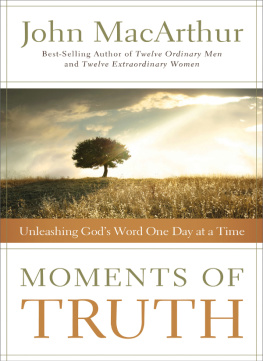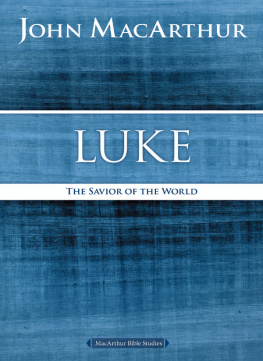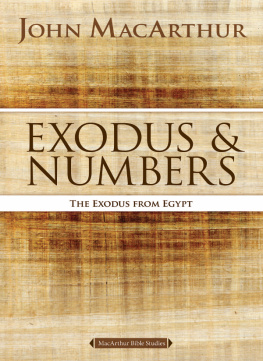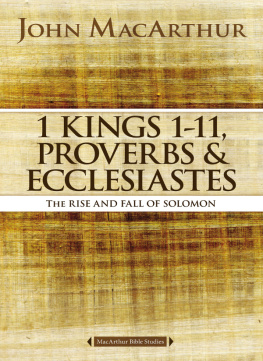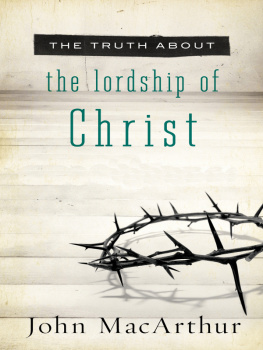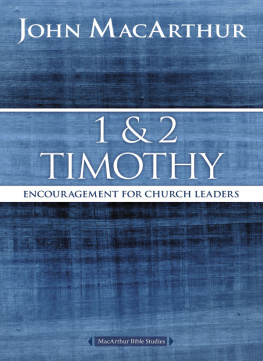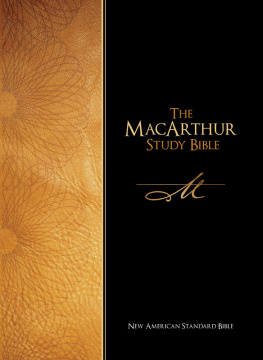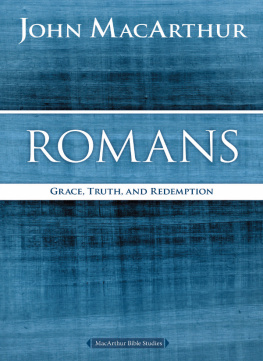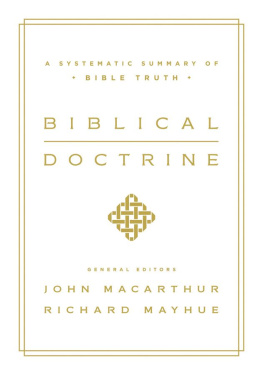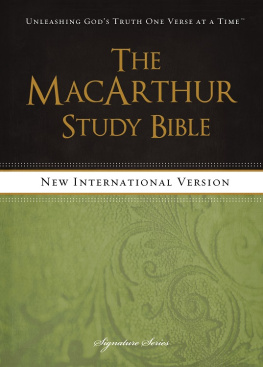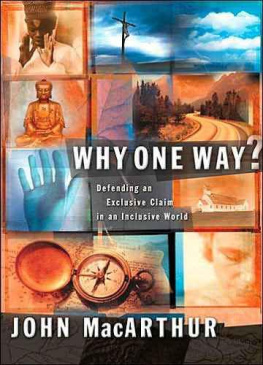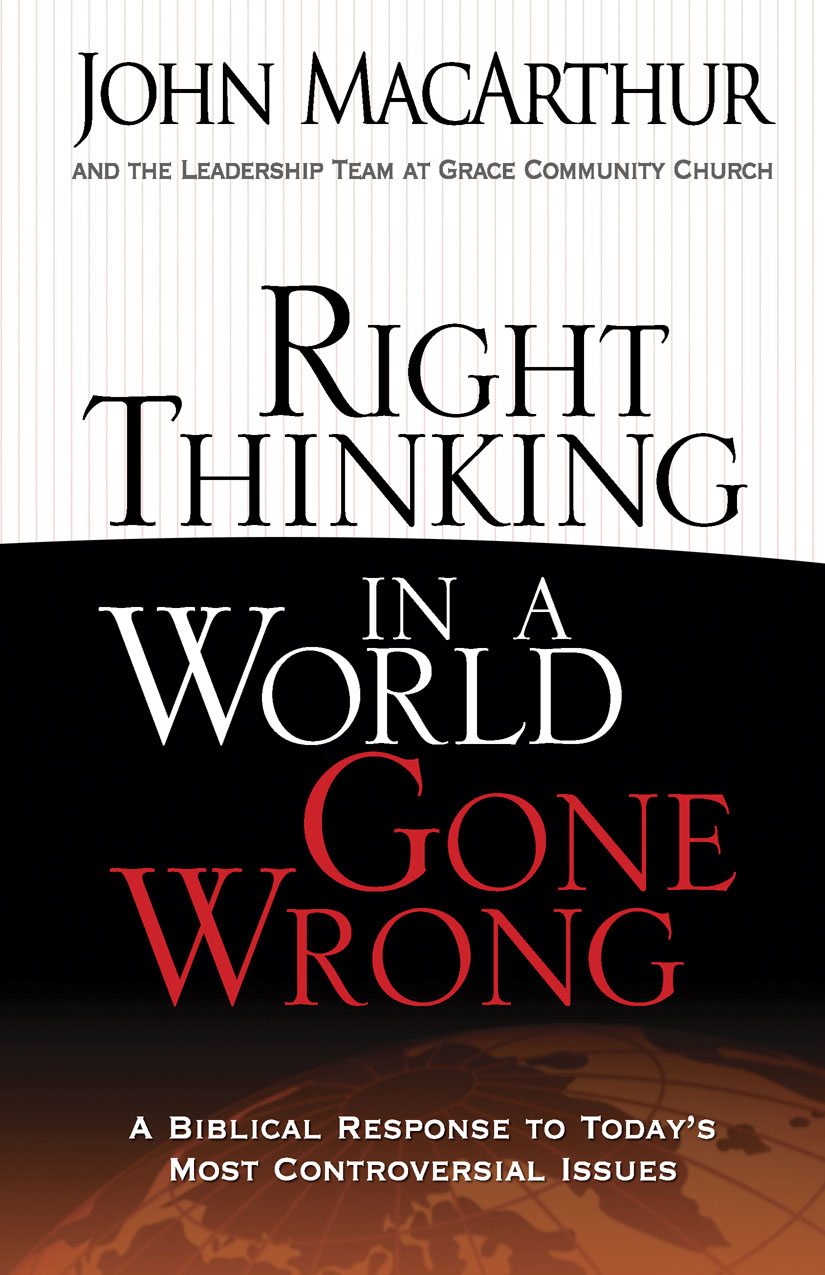J OHN M AC A RTHUR
AND THE L EADERSHIP T EAM AT G RACE C OMMUNITY C HURCH
R IGHT
T HINKING
IN A
W ORLD
G ONE
W RONG

HARVEST HOUSE PUBLISHERS
EUGENE, OREGON
Unless otherwise indicated, all Scripture quotations are taken from the New American Standard Bible, 1960, 1962, 1963, 1968, 1971, 1972, 1973, 1975, 1977, 1995 by The Lockman Foundation. Used by permission. (www.Lockman.org)
Verses marked NIV are taken from the HOLY BIBLE, NEW INTERNATIONAL VERSION. NIV. Copyright 1973, 1978, 1984 by the International Bible Society. Used by permission of Zondervan. All rights reserved.
Cover by Abris, Veneta, Oregon
John MacArthur: Published in association with the literary agency of Wolgemuth & Associates, Inc.
RIGHT THINKING IN A WORLD GONE WRONG
Copyright 2009 by Grace Community Church
Published by Harvest House Publishers
Eugene, Oregon 97402
www.harvesthousepublishers.com
Library of Congress Cataloging-in-Publication Data
MacArthur, John, 1939
Right thinking in a world gone wrong / John MacArthur and the Leadership Team at Grace Community Church.
p. cm.
ISBN 978-0-7369-2643-0 (pbk.)
1. Christianity and culture. 2. Thought and thinkingReligious aspectsChristianity. I. Grace Community Church (Sun Valley, Calif.) II. Title.
BR115.C8M2145 2009
261.0973--dc22
2008045619
All rights reserved. No part of this publication may be reproduced, stored in a retrieval system, or transmitted in any form or by any meanselectronic, mechanical, digital, photocopy, recording, or any otherexcept for brief quotations in printed reviews, without the prior permission of the publisher.
Printed in the United States of America
09 10 11 12 13 14 15 16 17 / BP-SK / 10 9 8 7 6 5 4 3 2 1
To our beloved flock at Grace Community Church, who make
the responsibility of shepherding the sweetest task on earth.
C ONTENTS
Gods Word and Everyday EthicsJohn MacArthur
Part 1
E NTERTAINMENT AND L EISURE
Christian Liberty and the World of EntertainmentJohn MacArthur
Internet Dating and God-Honoring RomanceRick Holland
Video Games and a Biblical WorldviewAustin Duncan
Making Wise Media Choices for You and Your FamilyKurt Gebhards
Entertainment, Escapism, and the Cult of CelebrityTom Patton
Part 2
M ORALITY AND E THICS
Issues Related to Divorce and RemarriagePastoral Perspective
Opposing Abortion While Reaching Out to Hurting WomenBill Shannon
Birth Control, In Vitro Fertilization, and SurrogacyPastoral Perspective
A Strategy for Ministering to Struggling ChristiansJohn D. Street
Euthanasia, Suicide, and Capital PunishmentPastoral Perspective
Part 3
P OLITICS AND A CTIVISM
How Should Christians Think About Political Activism?John MacArthur
Biblical Living in a Secular EconomyJonathan Rourke
Global Warming and the Environmental MovementPastoral Perspective
Racism and Reconciliation in Church and CultureMark Tatlock
Illegal Immigration and Border ControlPastoral Perspective
Part 4
T RAGEDY AND S UFFERING
Divine Providence and the Problem of EvilRick Holland
Responding Rightly to Personal Hardship and TrialsIrv Busenitz
Putting Your Hope in Your Heavenly FatherNathan Busenitz
The Role of Mercy in MinistriesJesse Johnson
The Gospel as Gods Solution for Our Fallen WorldKevin Edwards
Gods Word and Everyday Ethics
J OHN M AC A RTHUR
I t is common in the evangelical church today for people to verbally acknowledge that the Bible, as Gods Word, is the final authority for both what they believe and how they live. Yet in reality, a clear connection between that public confession and personal conduct is rare.
Claiming that Scripture is true and complete should preclude evangelicals from turning to other sources for establishing thought and life. Yet many do just that. In cosmology, for example, a straightforward reading of Genesis 12 is often dismissed on the basis of modern evolutionary theories. In apologetics, philosophy and human reason frequently take precedence over Scripture. And in church growth, demographic surveys, marketing techniques, and a man-centered theology with a watered-down gospel override clear biblical truth.
To this list, the subject of morality and ethics must be added. Instead of looking to the Bible, many professing Christians look to psychology and sociology for supposed solutions to personal needs and social ills. The rise of postmodern thought has similarly skewed the churchs understanding of right and wrongas an unbiblical tolerance (in the name of love) has weakened churches to the point where they are as soft on truth as they are on sin. Popular television shows, from Oprah to The Tonight Show to the average sitcom, have had a tangible effect (and not for the better) on how American Christians think through everyday issues. The political arena, too, has played a major role in shaping an evangelical understanding of morality, as words such as Republican and Democrat or liberal and conservative have come to redefine the difference between what is good and what is evil.
The fact is that far too many professing Christians live their lives, day in and day out, on the basis of something other than the Bible. As a result, their priorities reflect the worlds priorities, not Gods. Their patterns of behavior and their plans for the future differ only slightly from those of their unsaved friends and neighbors. Their expenditures reveal that their perspective is temporal, and that they are vainly pursuing the elusive American Dream. Their shortcomings, when they admit to them, receive the same fault-free labels that the world ascribes (mistakes or diseases or addictions rather than sins), as they search for answers in psychology, medication, or the self-help section of the bookstore. Though they adhere to an external form of traditional Christian moralism, there isnt anything particularly biblical or Christ-centered about how they live.
Yet it is in the lives of sinners who have been transformed by the gospel of grace that a distinctly Christian ethic must be fleshed out. True Christianity is not defined on the basis of external moralism, religious traditionalism, or partisan politics, but on the basis of a personal love for Jesus Christ and a desire to follow Him no matter what the cost (John 14:15). It is only because believers have been transformed on the inside (through the regeneration of the Holy Spirit) that they are able to exhibit godliness in their behavior. And the world cannot help but take notice. As Jesus told His hearers in the Sermon on the Mount, Let your light shine before men in such a way that they may see your good works, and glorify your Father who is in heaven (Matthew 5:16; cf. 1 Peter 2:12).
The Heart of the Christian Ethic
The heart of the Christian ethic, of course, is the gospel. Only those who have been transformed from within (Titus 3:5-8), being indwelt by the Spirit of God (Romans 8:13-14), are able to exhibit genuine holiness (Galatians 5:22-23; 1 Peter 1:16). Biblical Christianity is not primarily concerned with external behavior modification (cf. Matthew 57), but with a change of heart that subsequently manifests itself in a changed life (1 Corinthians 6:9-11).



